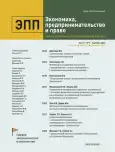Assessing the impact of budget openness on citizen and private sector attitudes toward government
- Authors: Romanova L.A.1, Karlovskaya E.A.2
-
Affiliations:
- Pacific National University
- Belgorod National Research University
- Issue: Vol 13, No 9 (2023)
- Pages: 3761-3780
- Section: Articles
- URL: https://journals.eco-vector.com/2222-534X/article/view/625177
- DOI: https://doi.org/10.18334/epp.13.9.119273
- ID: 625177
Cite item
Abstract
The principle of budget openness is one of the fundamental principles of the budget system at the international level. The purpose of this article was to identify the impact of the degree of budget openness on the attitude of citizens and the private sector to government, which is strongly influenced by cognitive factors. To do this, an analysis of the indicators of budget openness, the corruption perception index and the level of trust in the authorities was carried out. As a result of the conducted research, it is proved that the openness of budget data does not affect the increase of confidence in the authorities; simultaneously with the increase in openness, there is a growing risk of a decrease in trust in the authorities, incorrect interpretation of data due to the lack of detailed information. Based on the analysis, it was revealed that there is no relationship between budget transparency and the perception of corruption. The effect of budget openness directly depends on the cognitive perception of information by the subject. Taking into account the cognitive aspect of perception and cognition of information, an algorithm for developing the content of the budget for citizens is proposed. Its theoretical justification is carried out on the example of Russia.Acknowledgments:The research was carried out with the financial support of the Pacific National University within the framework of the scientific project "Innovative environment of the intercollegiate campus as a way to smooth out ecological and economic regional disparity".
About the authors
Lyudmila Aleksandrovna Romanova
Pacific National University
Email: 007634@pnu.edu.ru
Evgeniya Anatolevna Karlovskaya
Belgorod National Research University
Email: e.a.karlovskaya@gmail.com
References
- Бахтаирова Е. А. Бюджет для граждан как элемент концепции открытости органов власти // Известия Байкальского государственного университета. – 2020. – № 1. – c. 130-136. – doi: 10.17150/2500-2759.2020.30(1).130-136.
- Григорьева И. В. Ресурсы системы // Вестник Воронежского института МВД России. – 2022. – № 1. – c. 155-158.
- Кадзаев Х. А. Теоретико-правовые аспекты противодействия коррупции посредством реализации принципа, информационной открытости // Право и государство: теория и практика. – 2020. – № 10(190). – c. 126-128. – doi: 10.47643/1815-1337_2020_10_126.
- Федосов В. А., Драева Л.А. Бюджет для граждан как инструмент по-вышения прозрачности бюджета субъекта Российской Федерации // Hypothesis. – 2017. – № 1(1). – c. 12-22.
- Федосов, В. А. Повышение открытости бюджетов и общественного участия в бюджетном процессе в Российской Федерации // Финансы и кредит. – 2016. – № 9(691). – c. 29-40.
- Cordis A.S. Corruption and the Composition of Public Spending in the United States // Public Finance Review. – 2014. – № 42 (6). – p. 745-773.
- Doležalová J. The Political-Budget Cycle in Countries of the Euro-pean Union // Review of Economic Perspectives. – 2011. – № 11 (1). – p. 12-36.
- Edelman trust barometer (2022). [Электронный ресурс]. URL: https://www.edelman.com/trust/2020-trust-barometer (дата обращения: 21.09.2023).
- García I., Hayo B. Political budget cycles revisited: Testing the signalling process // European Journal of Political Economy. – 2021. – № 69. – p. 102030.
- International Budget Partnership (2019). Budget Survey. [Электронный ресурс]. URL: https://www.internationalbudget.org/open-budget-survey (дата обращения: 21.09.2023).
- Karlovskaya E.A., Romanova L.A. Client-Oriented Management in the Public Services Sphere as a Factor in Increasing the Level of Life Satisfaction. International Science and Technology Conference "FarEastСon" (ISCFEC 2019) // Atlantis Press. – 2019.
- Kwon I. Performance budgeting: effects on government debt and economic growth // Applied Economics Letters. – 2018. – № 25 (6). – p. 388-392.
- Minsky, (1975). Minsky's frame system theory. Theoretical issues in natural language processing, p. 104–116. [Электронный ресурс]. URL: https://doi.org/10.3115/980190.980222 (дата обращения: 21.07.2023).
- OECD (2017).OECD Budget Transparency Toolkit: Practical Steps for Supporting Openness, Integrity and Accountability in Public Financial Management. OECD Publishing, Paris. [Электронный ресурс]. URL: http://dx.doi.org/10.1787/9789264282070-en (дата обращения: 20.02.2022).
- Transparency International (2022). [Электронный ресурс]. URL: https://www.transparency.org/en/# (дата обращения: 21.09.2023).
Supplementary files











